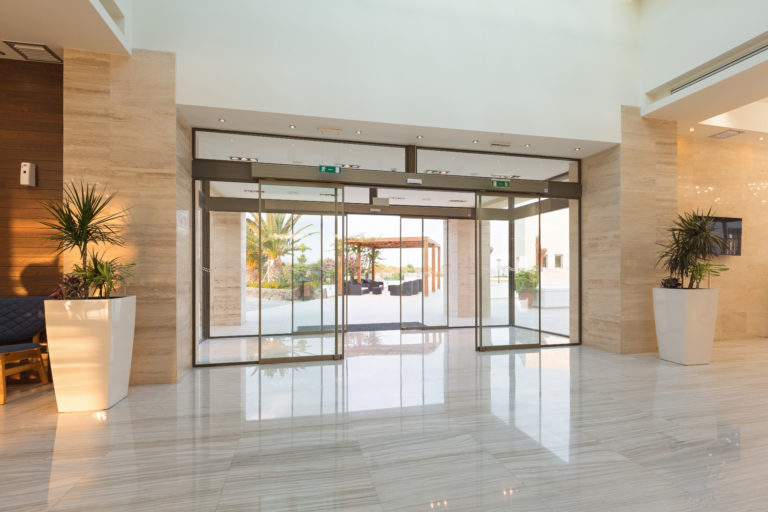
Most of us interact with automatic doors in our everyday life without really thinking about it. We find them at the supermarket, when going to work, or when visiting a hotel, and much more. But how do they work? How are they beneficial to us?
Automatic Doors and Sensors
Automatic doors require a sensor to work: When activated, the sensor triggers the opening and closing seemingly effortlessly. There are different types of sensors that can make this happen:
- Pressure sensors: Introduced in the 1960s, pressure sensors use mats that detect changes in the weight and pressure of a given area. Their main advantage is that they remain open for as long as people are standing on the mats. To this day, it is common to find them on advanced automated door systems as a backup, in case the primary sensor malfunctions.
- Motion detectors and optical sensors: Nowadays, most automated door systems use these sensors. Placed on the sides of the doors, they detect motion in front of the doors using a microwave beam produced by an antenna installed on the door header. While these motion detectors tend to work well, they do not always detect slow-moving pedestrians or people who are standing still, which can cause problems for older citizens.
- Infrared sensors: Infrared sensors detect changes in temperatures and detect body heat. They usually work in combination with other sensors such as motion detectors.
- Access control: These detectors rely on a signal from a key card, fob, code or phone or any other programmed device to grant access. These are useful for restricted areas where only authorized personal can go.
How Do Sensors Open The Doors?
Once the sensors have been triggered, this is when the magic happens.
Sensors are connected to an electronic motor that sends a signal to the door opening mechanism. This motor then triggers the doors to open all types of automatic doors.
These include:
- Sliding doors: Great for two-way traffic.
- Swinging doors: Ideal for one-way traffic.
- Folding doors: Great for small entrances/ to save space.
- Revolving doors: Perfect for high-traffic areas.
If you are interested in getting automatic doors, one thing to consider is the type of traffic you are expecting, as well as the space available.
Benefits of Automatic Doors
Although automatic doors may not be something we consciously think about, they facilitate our everyday life.
Some of their benefits include:
- Convenience: Automatic doors mean pedestrians can walk in and out regardless of how many things they may be carrying (for example in a supermarket) and facilitate movement.
- Preserving energy: It might not be the most obvious benefit on the list, but having automatic doors installed can help you reduce your bills. They can help preserve conditioned air and therefore prevent constant temperature changes.
- Touchless entry: Automatic doors mean no door handles are needed. This helps prevent germs or viruses like COVID from spreading through means of touch.
- Aesthetics: Lastly, automatic doors can do a lot for a modern and clean look.
